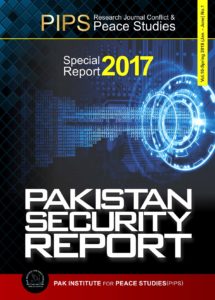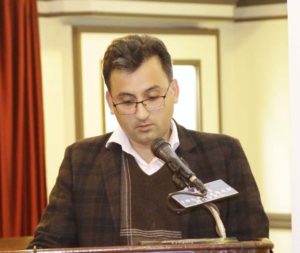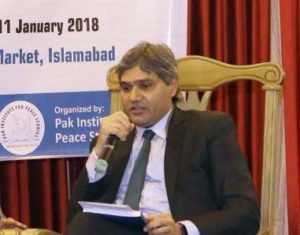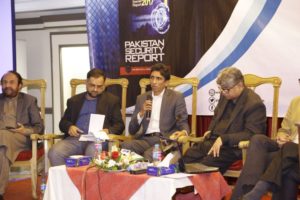“Pakistan lacks coherence in responses to counter terrorism and extremism”
Speakers noted at the launching ceremony of Pakistan Security Report 2017 that despite a reported decrease in the incidents of terrorist violence in the year there was little to suggest that a coherent state response was behind  this decrease or the factors of militancy and extremism had been eliminated. No was there any visible plan on the ground to sustain peace in areas which had largely been cleared of the militants such as the Federally Administered Tribal Areas (FATA). On the other hand, most of them noted, the state institutions were failing not only to grasp and effectively respond to emerging threats of Daesh and youth radicalization on campuses, but also to implement 3-year-old National Action Plan (NAP). One particular concern for the participants was the least participation of the Parliament in the discourse and implementation of national security policy in the country.
this decrease or the factors of militancy and extremism had been eliminated. No was there any visible plan on the ground to sustain peace in areas which had largely been cleared of the militants such as the Federally Administered Tribal Areas (FATA). On the other hand, most of them noted, the state institutions were failing not only to grasp and effectively respond to emerging threats of Daesh and youth radicalization on campuses, but also to implement 3-year-old National Action Plan (NAP). One particular concern for the participants was the least participation of the Parliament in the discourse and implementation of national security policy in the country.
Pakistan Security Report 2017 is 12th yearly review of Pakistan’s security developed by Pak Institute for Peace Studies. The report was launched in Islamabad on January 11, 2018 with a discussion on emerging security threats in the country. The event was attended by academia, diplomatic community, think-tanks representatives and media personnel, and was chaired by Murtaza Solangi, a senior journalist.
 Muhammad Ismail Khan, Senior Project Manager at PIPS, shared key findings of the report, including that there was 16 percent decline in overall terrorist incidences, compared to the year before. However, Tehreek-e-Taliban Pakistan (TTP) still remained a potent threat. He said that faith-based mob violence rose in 2017, mainly in Punjab. Furthermore, a new trend of urban educated youth’s growing inclination towards violent extremism was also observed in the year. Meanwhile, the Islamic State militant group, also known as Daesh, carried out six attacks in 2017 but they were the deadliest ones, which claimed over 150 lives. He recommended that parliament has to take main role in national security especially in overviewing National Action Plan. Moreover, he said that in Pakistan soft approaches for dealing with terrorists and extremists are missing such as measures aimed at preventing and countering violent extremism and ideological radicalism.
Muhammad Ismail Khan, Senior Project Manager at PIPS, shared key findings of the report, including that there was 16 percent decline in overall terrorist incidences, compared to the year before. However, Tehreek-e-Taliban Pakistan (TTP) still remained a potent threat. He said that faith-based mob violence rose in 2017, mainly in Punjab. Furthermore, a new trend of urban educated youth’s growing inclination towards violent extremism was also observed in the year. Meanwhile, the Islamic State militant group, also known as Daesh, carried out six attacks in 2017 but they were the deadliest ones, which claimed over 150 lives. He recommended that parliament has to take main role in national security especially in overviewing National Action Plan. Moreover, he said that in Pakistan soft approaches for dealing with terrorists and extremists are missing such as measures aimed at preventing and countering violent extremism and ideological radicalism.
 Dr. Farhan Zahid, terrorism and security analyst, talked about the emerging threat of Daesh. He said there is no structured organization of Daesh in Pakistan but still the threat is there. He shared that several small groups pledged allegiance to Daesh which is known as Walayat-e –Khurasan in Af-Pak region. He suggested that the issue of Daesh should be taken very seriously because being a salafi organization it might be able to recruit militants from Pakistan. He appreciated the role of the state, though, in combating Daesh-affiliated cells.
Dr. Farhan Zahid, terrorism and security analyst, talked about the emerging threat of Daesh. He said there is no structured organization of Daesh in Pakistan but still the threat is there. He shared that several small groups pledged allegiance to Daesh which is known as Walayat-e –Khurasan in Af-Pak region. He suggested that the issue of Daesh should be taken very seriously because being a salafi organization it might be able to recruit militants from Pakistan. He appreciated the role of the state, though, in combating Daesh-affiliated cells.
 Azaz Syed, senior journalist, said that not a single case was registered against Khadim Rizvi of Tehreek-i-Labbaik Ya Rasool Allah (TLYRA) for his repeatedly issuing hate speech, mainly during his sit-in at Faizabad in Rawalpindi. This is, he noted, how religious extremists had been challenging not only the writ of state but also NAP.
Azaz Syed, senior journalist, said that not a single case was registered against Khadim Rizvi of Tehreek-i-Labbaik Ya Rasool Allah (TLYRA) for his repeatedly issuing hate speech, mainly during his sit-in at Faizabad in Rawalpindi. This is, he noted, how religious extremists had been challenging not only the writ of state but also NAP.
 Baqir Sajjad, special correspondent of daily Dawn, stated that decline in terrorist attacks suggests that situation has improved but still there is no restriction on hate speech. He gave recommendations that the government should make sure that banned militant outfits should not re-surface. No individual listed on the Fourth Schedule should be allowed to contest election and there is a need of proper and transparent mainstreaming of militants.
Baqir Sajjad, special correspondent of daily Dawn, stated that decline in terrorist attacks suggests that situation has improved but still there is no restriction on hate speech. He gave recommendations that the government should make sure that banned militant outfits should not re-surface. No individual listed on the Fourth Schedule should be allowed to contest election and there is a need of proper and transparent mainstreaming of militants.
 Speaking on the performance of National Action Plan, Muhammad Amir Rana, Director PIPS, said that there are still ambiguities that who is the in-charge of NAP. He mentioned that though a lot of policies like National Security Policy and National Internal Security Policy for curbing extremism are being formed but the role of parliament is missing in all these exercises. Moreover, he said that Nacta claimed that they have formed National Extremism Policy, whether they contacted the academia, intelligence agencies and parliament for their output? All these policies are being formed but without the involvement of parliament and the state stakeholder which is the common citizen.
Speaking on the performance of National Action Plan, Muhammad Amir Rana, Director PIPS, said that there are still ambiguities that who is the in-charge of NAP. He mentioned that though a lot of policies like National Security Policy and National Internal Security Policy for curbing extremism are being formed but the role of parliament is missing in all these exercises. Moreover, he said that Nacta claimed that they have formed National Extremism Policy, whether they contacted the academia, intelligence agencies and parliament for their output? All these policies are being formed but without the involvement of parliament and the state stakeholder which is the common citizen.
 Speaking on militancy, FATA and Pak-Afghan relations, senior journalist Tahir Khan said that the people in FATA are still deprived of basic rights which had in the first place created spaces for militants. He said that tribal people want reforms in FATA but the process of implementing FATA reforms is very slow.
Speaking on militancy, FATA and Pak-Afghan relations, senior journalist Tahir Khan said that the people in FATA are still deprived of basic rights which had in the first place created spaces for militants. He said that tribal people want reforms in FATA but the process of implementing FATA reforms is very slow.
Gallery:
















